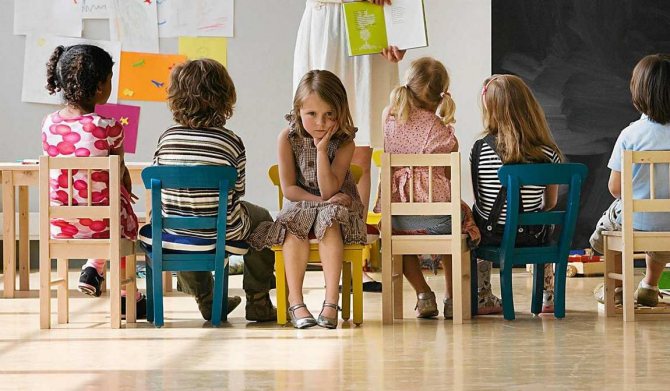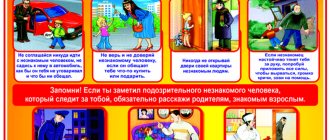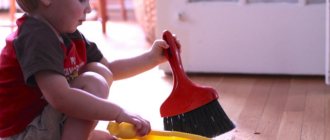The main difficulties and their solutions in raising preschool children
Many specialists in the field of pedagogy strive to find solutions to the problems of raising children of different ages. But first you need to find the reasons why certain problems arise.
Causes of parenting difficulties
In pedagogical practice, there are three types of child upbringing:
– dictatorial style; – overprotection; – democratic style. Thus, almost each of these types can cause problems in the educational activities of parents. Firstly, the first type can develop in the child low self-esteem and fear of making any decision, and there is also a high risk of developing a rebellious character. And, secondly, overprotection can cause the formation of a fastidious, arrogant and selfish person. All these results can lead to a number of problems that will be discussed further.
The main problems of raising preschool children and their solutions
The behavior and complete image of a child is created at the age of 6-7 years, when he enters society and daily interaction with it. During this period, problems in raising a child are most acute. The main problems that every adult may encounter: – deviation from the rules of personal hygiene. Any child, even the smallest one, can show his unwillingness to listen to his parent. Parents who have been fulfilling any whims of their child for a long time can often encounter such problems. As a result, at some point they are faced with the fact that the child does not want to meet them halfway under any pretext. Many children refuse a bubble bath or a toothbrush. But even such stubborn people have their own approach. It is important to arouse genuine interest in the baby. To do this, you just need to buy a toothbrush in the shape of your favorite cartoon character, fragrant toothpaste, a funny washcloth and rubber toys for the bathroom. - the desire to get everything at once. Often parents have to deal with very capricious and demanding behavior of the child. This can manifest itself in the desire to get what you want. The child will demand to buy him new toys, give him more candy than usual, and much more. To solve this problem, many parents take a simple route - fulfill any desire of the child in order to force him to fulfill any request. But every adult must be aware that such submission can lead to negative results. Therefore, to solve this problem, you should not allow your child to manipulate you. You need to talk to your child, be confident and persistent, and explain (even if it’s the 101st time) what he can and cannot do. – lack of communication skills. Experts often say that children under three years of age most often play alone. For many children at this age this is the norm. It is for this reason that situations occur in which a child does not want to share his toy with other children. During this period, the role of the parent increases even more, since it is he who must explain to his child the rules of behavior with other children. Every year the child will improve his communication skills and, as a result, problems with peers will become less significant.
These problems are not the only ones of their kind. A modern child can cause dozens of problems. But there are no difficulties that cannot be overcome. Adults need to realize that there is a way out of even the most difficult situation. Most problems are temporary and after a couple of years, or maybe even months, parents will not remember about them.
Moral manner of speaking
The intonation and manner of speaking of teachers who enjoy authority among children leads to the fact that children begin to copy it in conversation with everyone. A moralizing tone becomes the norm of their conversation. Parents need to try very hard to become an indisputable authority for their child, someone they would like to emulate.
Snitch in kindergarten. Photo Yandex.Pictures
Intimidation and horror stories
Pupils of middle and senior kindergarten groups often amuse themselves during walks by telling each other terrible and scary stories. This happens when educators do not ensure that children play active or interesting mass games. They stick to their mobile phones and surf the Internet, and the children are left to their own devices.
As a result of such stories, children are afraid to be alone at home, and even to enter the room if the lights are off.
Bad behavior
Children happily adopt bad manners: they think it is very funny and worthy of encouragement. Parents are perplexed when they see for the first time how their baby enthusiastically picks his nose, wipes his dirty hands on his clothes, or, without using a handkerchief, smears snot all over his face. It’s even worse when, in response to any disagreement with an opinion, he begins to spit on the person.
It is useless to beat and constantly scold a child. Try, without losing your temper, to clearly explain to your child that from the outside he looks very ugly using such behavior.

The child has bad manners. Photos
Aggressive behavior
You can often observe how kids take aim at their parents if they do not comply with their demands. There is a manifestation of aggression on the part of the child. There are many reasons for this behavior: fights with peers, assault by teachers, problems communicating with children.
Often parents, blaming kindergartens for the fact that their child’s behavior has deteriorated because of them, do not pay attention to the change in the atmosphere in their family. Before making complaints to teachers, it is worth analyzing the behavior of household members and the attitude in your family. Perhaps the difficult relationship between you and your husband or with your parents caused a change in the child’s character.
Snitching
Usually, teachers encourage and transfer to the category of favorites those children who snitch on the rest of the students in the group. Unfortunately, by setting the example of children who “snitch” on their own friends, educators thereby form in the child an incorrect attitude towards peers. Children need to be taught to observe themselves, to monitor their good manners, and not to report to the teacher about someone else’s mistake.
MAGAZINE Preschooler.RF
Problems of modern education of preschool childrenMusical director Nadezhda Nikolaevna Yanova. MBDOU "Kindergarten No. 10 "Malyutka" Tambov, Tambov region
“It educates everything: people, things, phenomena, but first of all and for the longest time - people. Of these, parents and teachers come first. With the entire complex world of surrounding reality, the child enters into an infinite number of relationships, each of which invariably develops, intertwines with other relationships, and is complicated by the physical and moral growth of the child himself. All this “chaos” seems to defy any accounting, however, it creates at every moment certain changes in the child’s personality. To direct and manage this development is the task of education...”
A.S. Makarenko
Spiritual and moral education is the most important condition for the formation of a holistic personality, truly independent and responsible, capable of creating their own idea of their life path and realizing it in real conditions and circumstances.
It is well known that spiritual and moral education is an integral component of the comprehensive development of the individual. Positively - directed spiritual and moral feelings that can inspire a child to noble deeds are not given to him ready-made from birth. “They arise and develop throughout childhood under the influence of social conditions of life and upbringing ,” wrote A. Zaporozhets.
When raising a child, both educators and parents hope to raise him to be a worthy person. Every parent wants to be proud of their child. But how to direct education in the right, “right” direction? How to lay in it the foundation that would be the foundation of all further actions and actions of the child, at a time when there is a lot around that goes against the foundations of spiritual and moral education. Currently, the media constantly show businessmen, politicians, and representatives of show business, who are quite difficult to consider as an example that a child can follow in building an image of his future life path. The bright images of astronauts, miners, doctors and scientists, who for a long time were ideals for previous generations, have long since sunk into oblivion.
The situation is also ambiguous in the field of children's programs, which offer non-childish humor and show-style solutions, which does not make it possible to gain that experience of emotional empathy for the characters, which is so valuable and develops the spiritual qualities of a child.
In general, the problem of spiritual and moral education in modern conditions, in my opinion, is that in the process of education the historical continuity of generations is not respected; modern children have lost moral guidelines, guidelines for . ” Modern parents want their child to be successful, to be able to “achieve something in life on his own . But very often the key word “SELF” from the positive “independent” develops into the negative “alone, sole . And as a result, nowadays there are more and more children who like to play alone; those who are not accepted into games by other children; those who know how to communicate only with adults. raised “for himself” is left alone with himself. He cannot learn to build harmonious relationships with other people, since without understanding the other, without taking into account his interests and needs, productive joint activities, cooperation, and joyful communication are impossible. The formation of spiritual and moral values also becomes impossible.
Spiritual and moral education is a complex pedagogical process, which is based on the development of feelings, therefore the task of the family is to lay the foundations of spiritual and moral education, and the kindergarten is to help parents realize that, first of all, moral and spiritual customs must be preserved and passed on in the family and values. In some families, children are oriented towards knowledge and intelligence, in others – towards education, in others – towards material wealth.
When cultivating spiritual and moral qualities in a child, the teacher focuses on:
- productive and necessary work for other people, trying to help the child think again and again about what he wants to do, in what areas of activity he intends to realize himself;
- clear ideas about right and wrong, which include a commitment to the values of justice, truth, mutual aid, compassion and respect for the life of every being;
- respect for the culture, religion and history of one’s people and one’s country;
after all, just as it is natural for a person to want to be proud of his parents, it is natural to want to be proud of the people to which he belongs.
And the task of a modern preschool teacher is to create, on the basis of person-oriented interaction with the child, accepting and supporting his individuality, interests and needs, taking into account the opinions and wishes of parents, conditions that will most contribute to spiritual development -moral values of a small citizen of his homeland.
| Next > |
The problem of preschool education
In the process of raising a child in the preschool period, the position of parents is of great importance. It is very important that parents take a coordinated position in relation to the child. However, parents often have disagreements over parenting methods.
There can be many reasons for such disagreements. These disagreements are usually based on personal experience. Some parents try to copy the behavior towards their children from the methods that were applied to them in childhood by their parents. Others, on the contrary, often, disagreeing with parental methods, choose a different path, often completely opposite. This happens when adults experienced pressure from their parents in childhood. And, based on their experience, they begin to allow their children too much. Very often this leads to the emergence of a self-centered, irresponsible pattern of behavior in children. Which subsequently leads to problems of education at school and the socialization of the child in the team.
A serious factor in choosing a parenting model is the character of the parents. Typically, a stricter father insists on unquestioning obedience, while a softer mother, on the contrary, is more likely to indulge the child’s whims and weaknesses. This can lead to two lines in the child's behavior. The first option is that the child’s anxiety level will increase due to constant anticipation of the next step on the part of the parents. And the second option is that the child develops a tendency to manipulate his parents. So, after being punished by his father for an offense, he can ask his mother for forgiveness and even compensation in the form of a gift. This undermines the father's authority.
However, behind the mask of strictness in adults, a soft nature with low self-esteem is often hidden. Usually this behavior stems from the desire to protect the child from his own mistakes. Often such people create such spartan conditions that they endanger the child’s mental health.
The problems of preschool education of children solved only through resolving disagreements between parents. This is one of the main problems of raising a child in a family. Such disagreements often indicate problems within the family itself. The child has to take a position between mom and dad. He wants to be loved by all family members, and this is the main motivation. To get such approval from everyone, he has to lie and dodge. The child develops various neurotic manifestations - outbursts of aggression, fears and even enuresis. These manifestations of problems in preschool education of children lead to the development of even more serious problems during adolescence. It is difficult for such a child to develop moral and ethical guidelines, which interferes with the development of his personality.
Diseases
If your child has a strong immune system from birth, then it may fail for many children who, from the first days of attending kindergarten, are faced with various viral and infectious diseases.
In the first year of attending kindergarten, children often suffer from ARVI, flu and sore throat. Pediatricians, reassuring parents, assure that if a child gets sick up to 10-12 times a year, then this is quite normal. However, most mothers work, and if grandmothers are not around, then they have to take sick leave; this state of affairs does not suit all employers.
In addition to the “usual” illnesses, parents need to be prepared for the fact that their child may get chickenpox and will have to hand over tickets and cancel their vacation trip.

Chickenpox in kindergarten. Photo check-robot
It is no better than rotavirus and intestinal infections, to which children attending kindergartens are susceptible.
And with what horror mothers react when they discover lice on their child. Children from different families attend the group, so it is possible that being next to a lousy child, yours will not bring them into the house.
The new severe viral disease coronavirus does not spare children either. There are many cases where children become infected from their own teachers. And in the best case, all other family members will not become infected from the child.
Obscene words
Adults should not hope that their child, without hearing curses or obscene expressions at home, will remain completely unaware of them. Everything new and unusual attracts the child’s attention, so they immediately remember curse words. Many people don’t know how to deal with this: let it take its course, wait until he gets tired of expressing himself like that, or stop it and even punish him for it? Unfortunately, there is no universal recipe for this.

Adaptation to kindergarten. Photo kidpassage.com




